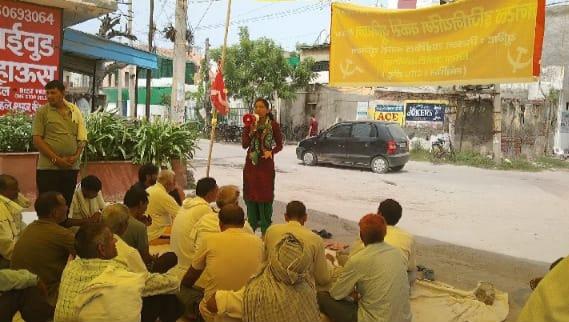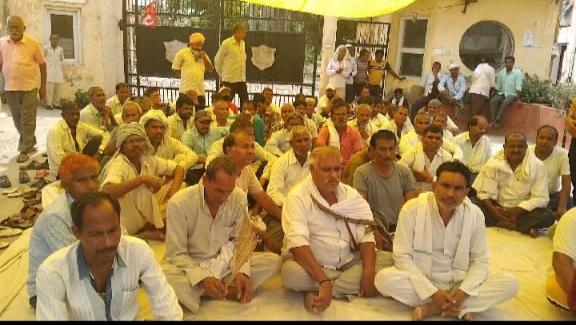Sonipat: We Have No Option but to Die, Say Protesting Employees

As India’s COVID situation improves, workers of the country continue to reel with debt, cycle of job losses, and the dilution of labour codes taking away any hope of social security and job guarantees.
In May 2021, Milton Cycles Limited, a Sonipat based mass manufacturer of bicycles shut shop. Five months down the line, over 200 workers of the firm have taken to the company’s doorstep, protesting day in and out for their wages, rights, and fair compensation.
With a case pending in the labour court, the workers state that they were laid off without notice. At the brink of homelessness and hunger, they state that this to them is a battle for survival.
“We are protesting for our survival, we have been eating like beggars standing in a line. We were being paid only half our wages last year before the owners decided to shut shop, leaving us without any guarantees, security or any other option of survival.” said Surinder Malik, vice-president of Milton Cycles Workers’ Union.

Majority of the 223 workers of the firm are migrant workers, who had come into the industrial town with a hope for a better future. Now struggling to pay for rent, food and their children’s education. Prior to the pandemic the workers stated that they were paid Rs 10,000 per month. However, the wages were inconsistent.
The protesting workers informed that previously the strength of the factory was over 500, however, many were laid off. Owing to the stress of the pandemic and the financial instability that has come with it, many have also lost their lives, and many others contemplating death.
“I will kill myself. That is the only way. Our lives are dispensable, they don't matter.” says Ashok. He had been working in the factory for over 27 years and is now struggling to survive. Speaking to NewsClick, he explained, “I am the only one who is earning, my children are still studying. I want to kill myself I cannot begin to explain what I am going through, I am not able to provide for my family. With my job taken away from me, I have no money, there are no pensions in this sector that we work in. I am too old to work anywhere else, despite giving it my all for over 30 years, I have nothing left with me. We are eating like beggars, we have sold off everything just to be able to afford two square meals”
The story of Ashok is not his alone. Over 15.33 million Indians lost their jobs in May. The number of people employed fell to 375.45 million in May from 390.79 million in April, according to the Centre for Monitoring Indian Economy (CMIE). In April and May, the number of people employed in salaried and non-salaried jobs fell by almost 23 million as the second wave of the pandemic infected millions of Indians, and states imposed lockdowns to stem the spread of the virus.
However, the brunt of joblessness is striking in the informal sector, data by Mint shows: “Informal sector workers, who had not been earning adequately before the pandemic, further lost their primary income sources due to loss of jobs. At the same time, the prices for essential commodities increased due to their unavailability in the markets driven by massive disruption of the supply chains. 80% of India's informal workers lost jobs lost jobs during COVID lockdown, 63% survived on two meals a day.”
The workers demand job and social security benefits along with food security. The Narendra Modi government is slated to announce the implementation of the Labour codes shortly.
The codes which dilute labour laws will herald an employment arrangement in the country which can be traced back most closely to industries in 19th century Europe. Characterised by a deep absence of trade unions, restrictive bargaining powers of workers and extreme unilateral power of employers to hire and fire. Making cases like that of Milton workers extremely difficult to get justice.
The three bills—The Occupational Safety, Health and Working Conditions (OSH&WC) Code, 2020, The Industrial Relations (IR) Code, 2020, and The Code on Social Security, 2020—were tabled in Parliament on Saturday. Last year, The Code on Wages, 2019, which sought to regulate wage and bonus payments in all matters employment, was passed by both houses of Parliament. Altogether, the four codes form part of an ambitious move by the Narendra Modi government to bring in reforms for the easier compliance of labour standards, thereby bolstering investmentsAs farmers and workers join hands to challenge the arbitrarily passed laws, protests have been continuing across India. On August 9, countrywide protests were held on by trade unions, farmer organisations and other sections of the society demanding repeal of the three farm laws, labour codes, the Electricity Amendment Act, among other demands.
Get the latest reports & analysis with people's perspective on Protests, movements & deep analytical videos, discussions of the current affairs in your Telegram app. Subscribe to NewsClick's Telegram channel & get Real-Time updates on stories, as they get published on our website.
























